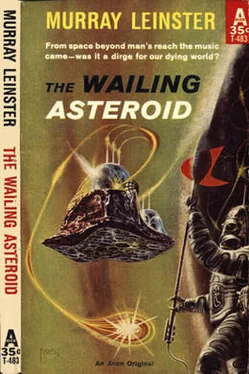He went into the office. Pam was in the midst of a fit of the giggles.
"One of them," she explained, "is the nice man who moved into the boardinghouse. He wants to take me to the movies. Did you notice that they came when it ought to be my lunchtime? He asked when I went to lunch … "
Holmes came in. He scowled.
"One of my men says that one of those characters has been buying him drinks and asking questions about what we're doing."
Burke scowled too.
"We can let your men go home in three days more."
"I'm going to start loading up," Holmes announced abruptly. "You don't know how to stow stuff. You're not a yachtsman."
"I haven't got the shaft under control yet," said Burke.
"You'll get it," grunted Holmes.
He went out. Pam giggled again.
"He doesn't want me to go to the movies with the nice man from Security," she told Burke. "But I think I'd better. I'll let him ply me with popcorn and innocently let slip that Sandy and I know you've been warned that bomb shelters won't find a mass market unless they sell for less than the price of an extra bathroom. But if you want to go broke we don't care."
"Give me three days more," said Burke harassedly.
"Well try," said Sandy suddenly. "Pam can fix up a double date with one of her friend's friends and we'll both work on them."
Burke frowned absorbedly and went out. Sandy looked indignant. He hadn't protested.
Burke got Holmes' four workmen out of the ship and had them help him roll the bronze shaft to the pit and let it down onto a cradle of timbers. Now if it moved it would have to penetrate solid earth.
The most trivial of computations showed that when the bronze shaft had flown thirty miles, it hadn't done it on the energy of a condenser shorted through its coils. The energy had come from somewhere else. Burke had an idea where it was.
Presently he verified it. The cores and windings he'd adapted from a transparent hand–weapon seen in an often–repeated dream—those cores and windings did not make electromagnets. They made something for which there was not yet a name. When current flows through a standard electromagnet, the poles of its atoms are more or less aligned. They tend to point in a single direction. But in this arrangement of wires and iron no magnetism resulted, yet, the random motion of the atoms in their framework of crystal structure was coördinated. In any object above absolute zero all the atoms and their constituent electrons and nuclei move constantly in all directions. In such a core as Burke had formed and repeated along the shaft's length, they all tried to move in one direction at the same time. Simultaneously, a terrific surge of current appeared in the coils. A high–speed poleward velocity developed in all the substance of the shaft. It was the heat–energy contained in the metal, all turned instantly into kinetic energy. And when its heat–energy was transformed to something else, the shaft got cold.
Once this fact was understood, control was easy. A single variable inductance in series with the windings handled everything. In a certain sense, the gadget was a magnet with negative—minus—self–inductance. When a plus inductance in series made the self–inductance zero, neither plus nor minus, the immensely powerful device became docile. A small current produced a mild thrust, affecting only part of the random heat–motion of atoms and molecules. A stronger current produced a greater one. The resemblance to an electromagnet remained. But the total inductance must stay close to zero or utterly violent and explosive forward thrust would develop, and it was calculable only in thousands of gravities.
Burke had worked for three weeks to make the thing, but he developed a control system for it in something under four hours.
That same night they got the bronze shaft into the ship. It fitted perfectly into the place left for it. Burke knew now exactly what he was doing. He set up his controls. He was able to produce so minute a thrust that the lath–and–plaster mould merely creaked and swayed. But he knew that he could make the whole mass surge unstoppably from its place.
Holmes sent his workmen home. Sandy and Pam went to the movies with two very nice men who pumped them deftly of all sorts of erroneous information about Burke and Holmes and Keller and what they were about. The nice men did not believe that information, but they did believe that Sandy and Pam believed it. For themselves, the combination of an object made by Burke which flew thirty miles plus the presence of Holmes, who built plastic yachts, and the arrival of Keller to adjust instruments of which they had a complete list—these things could not be overlooked. But they did feel sorry for two nice and not over–bright girls who might be involved in very serious trouble.
Holmes and Burke installed directional controls, wiring, recording instruments, etc. Stores and water and oxygen, for emergency use only, went into the lath–and–plaster construction. Holmes took a hammer and chisel and painstakingly cracked the mould so that the top half could be lifted off, leaving the bottom half exposed to the open air and sky.
Then the broadcast from space cut off. It had been coming continuously for something like five weeks; one sharp, monotonous note every two seconds, with a longer, fluting broadcast every seventy–nine minutes. Now a third, new message began. It was yet another grouping of the musical tones, with a much longer interval of specific crackling sounds.
Keller had adjusted every instrument and zestfully retested them over and over. Burke asked him to see if the third space message compared in any way with the second. Keller put them through a hook–up of instruments, beaming to himself, and the answer began to appear.
Newspapers burst into new headlines. " Ultimatum from Space " they thundered. " Threats from Alien Space Travelers. " And as they presented the situation it seemed believable that the third message from the void was a threat.
The first had been a call, requiring an answer. When the answer went out from Earth, a second message replaced the call. It contained not only flute tones which might be considered to represent words, but cracklings which might be the equivalent of numbers. The continuous beepings between repetitions of the second message were plainly a directional signal to be followed to the message source.
In this context, the newspapers furiously asserted that the third message was a threat. The first had been merely a summons, the second had been a command to repair to the signaling entities, and the third was a stern reiteration of the command, reinforced by threats.
The human race does not take kindly to threats, especially when it feels helpless. In the United States, there was such explosive resentment as to require spread–eagle oratory by all public figures. The President declared that every space missile in store had been fitted with atomic–fusion warheads and that any alien spacecraft which appeared in American skies would be shot down immediately. Congress reported out of committee a bill for rocket weapons which was stalled for six days because every senator and representative wanted to make a speech in its favor. It was the largest appropriation bill ever passed by Congress, which less than five weeks before had cut two hundred millions out of a guided–missile–space–exploration budget.
And in Europe there was frenzy.
For Burke and Holmes and Sandy and Pam and the smiling, inarticulate Keller, the matter was deadly serious. Fury such as the public felt constituted a witch–hunt in itself. Suspicious private persons overwhelmed the FBI and the Space Agency with information about characters they were sure were giving military secrets to the space travelers on M–387. There were reports of aliens skulking about American cities wearing luxuriant whiskers and dark glasses to conceal their non–human features. Artists, hermits, and mere amateur beard–growers found it wise to shave, and spirit mediums, fortunetellers and, in the South, herb doctors reaped harvests by the sale of ominous predictions and infallible advice on how to escape annihilation from space.
Читать дальше







